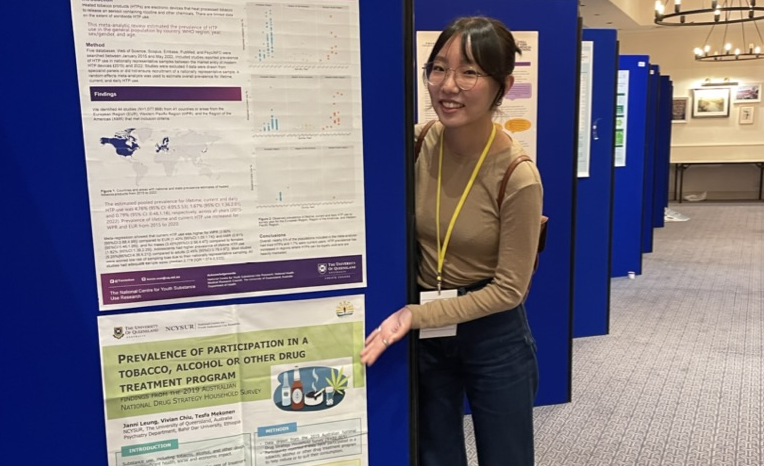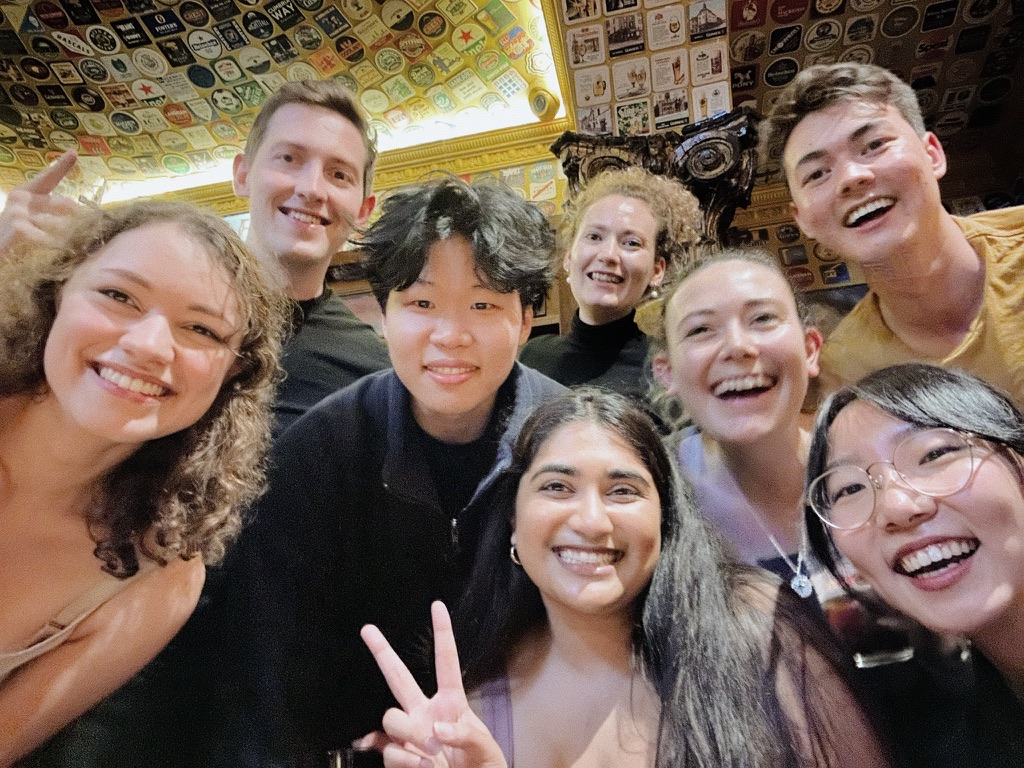Tianze Sun blogs about some of the highlights from her memorable month-long adventures, travelling from Australia to the UK and Portugal, and building new collaborations and friendships with fellow nicotine and tobacco researchers.
I am a fourth-year PhD student from the National Centre for Youth Substance Use Research at The University of Queensland, Australia. For the past three years, I have worked on generating knowledge about the public health benefits and costs of e-cigarette use to inform policy and influence practice.
In November 2022, I was awarded an SSA Travelling Scholarship, which provided me with an opportunity to travel to London and Lisbon. During this time, I visited two institutions – the Nicotine Research Group at King’s College London (KCL) and the Tobacco and Alcohol Research Group at University College London (UCL).
I had three main objectives for my visit: (1) to work on a project with leading nicotine and tobacco researchers in the UK about the features of vaping products that people who smoke and vape perceive as contributing to the health harms of vaping; (2) to build international collaborations with experts in the field; and (3) to disseminate my research at the SSA’s PhD Symposium and Annual Conference, as well as Lisbon Addictions.
Presentations by day, pizza by night
My journey began in Bristol, where I attended and presented at the PhD Symposium and Annual Conference. Researchers, practitioners, policymakers, and students from around the world presented their work, networked with colleagues, and learned about the latest developments in the field of addiction.

The PhD Symposium was a day filled with the exchange of ideas. There was a thought-provoking workshop on the importance of impact, inclusivity, and involvement in addictions research. The panel of experts shared their insights about how to avoid tokenistic public involvement in research – emphasising the importance of long-term commitment and inclusivity in the process. Additionally, I presented my study on the global prevalence of heated tobacco product use. This was a unique opportunity for me to share my findings and receive valuable insights from colleagues in the field.
After a stimulating day of listening to PhD students present their work, we had a delicious dinner event at Vincenzo’s Pizza House in Bristol – allowing the students to mingle and connect over stories of their PhDs.
Spending time with ‘bright and brilliant’ colleagues
From Bristol, I travelled back to London, where I spent most of my time with the team at the Nicotine Research Group, hosted by Dr Katie East. Katie is an SSA Griffith Edwards Academic Fellow and Research Associate, working on various projects relating to nicotine and tobacco product perceptions and use, with a focus on young people.
[metaslider id=”36014″]I worked with Katie on an exploratory study to examine the features of vaping products that people who smoke and vape perceive contribute to the health harms of vaping. During my time, I observed and assisted Katie with recruiting participants via Prolific Academic. Designing and collecting data via a survey was a novel learning experience for me, as I have primarily relied on readily-available public data throughout my PhD. My colleague, Giang Vu, and I began conducting exploratory secondary analyses of the data. We presented and discussed the findings of this research at the monthly Nicotine Research Group lab meeting. This is still an ongoing project and remains a collaborative research effort. Results from the study will be published as a peer-reviewed paper and will inform our understanding of how vaping risk perceptions vary between people who smoke and people who vape.
I was invited to attend the introductory module lectures, one of which was the ‘Natural History of Addictions’, presented by Professor John Cunningham. Katie also facilitated collaborations with leading figures in tobacco and nicotine from the Department of Addictions, including Professor Ann McNeill, Dr Leonie Brose, and Dr Erikas Simonavičius. Leonie took us out to lunch at the KCL Denmark Hill campus, and I was given an opportunity to investigate the current work being conducted by her team at the Nicotine Research Group and explore any further opportunities for collaboration.
In addition, I had the privilege of meeting with bright and brilliant higher-degree research students and post-doctoral researchers at KCL, including but not limited to Eve Taylor, Hannah Walsh, Matilda Nottage, and Kimberly D’Mello. We discussed how divergent approaches to regulating nicotine vaping products in the UK and Australia have resulted in different outcomes for both countries. For example, Australia prohibits the sale and use of nicotine vaping products unless a doctor prescribes them, whilst the UK applies a ‘hands off’ approach to regulation, resulting in more widespread use, especially among young people. These interactions provided a valuable chance to discuss their research findings in the UK and compare it to my own from Australia. Additionally, we explored emerging opportunities within the field, grant ideas, and career paths we would like to pursue.
The Nicotine Research Group and I were all heading to Lisbon Addictions a week later, so on Thursday, we rehearsed our presentation. This was a beneficial experience as I was able to receive feedback on my presentation slides. Afterwards, we went out for drinks, and I discovered that many of the bars in London are pet friendly!
As the last days of my visit approached, Katie organised an excursion with the Nicotine Research Group. This consisted of a free walking tour around ‘Royal London’, paired with a delicious meal afterwards. Our guide would share his knowledge of England’s rich history, including the colourful exploits of King Henry VIII and his many wives, all while cradling his adorable furry companion.
Sweet port wines and novel statistical methods in Lisbon
After a three-week sojourn in a place that had already started to feel like home, I travelled to Lisbon, Portugal, with two other students from the National Centre for Youth Substance Use Research in Queensland. Along the way, we stopped in Porto to taste-test their famous sweet port wines before delving into the three-day Lisbon Addictions conference.
[metaslider id=”36024″]The conference was stimulating and thought-provoking. I had the opportunity to meet and connect with leading scholars in the field of addiction and expose myself to a broad range of research topics, ideas, and innovative statistical methodologies.
On the second day of the conference, I presented work about heated tobacco products with colleagues from institutions including King’s College London, University College London, and Heinrich Heine University. Dr Leonie Brose chaired the session, and we shared the current evidence on the prevalence and perceptions of heated tobacco products and their use as a smoking cessation aid. Data from countries such as the UK, Germany, and Lithuania were presented, sparking interesting discussions with the audience on the future regulation of novel tobacco products, measurement of novel tobacco products, and potential explanations for the results. Presenting my research alongside prominent colleagues in nicotine and tobacco research was a valuable opportunity to promote my work and increase my visibility within the field.
As I wandered around the conference, I stumbled upon my poster presentation on one of the large digital kiosks. I also met with Harry Tattan-Birch, who is a doctoral student at UCL, to discuss potential future projects using the Population Assessment of Tobacco and Health Survey, ways to integrate novel statistical methods, and one of the randomised controlled trials he is currently working on about e-cigarettes for smoking cessation.
Going home
Upon returning to Australia, I continued to collaborate and connect with the network of researchers I met from around the world. I have been applying the knowledge, skills, and perspectives I gained in my own work, and sharing them with peers and colleagues.

Throughout my travels, I had the privilege of meeting and learning from scholars in the field of addiction and tobacco control, which allowed me to gain invaluable insights into the latest research in my field. I am very grateful to Dr Katie East, Professor Ann McNeill, and their teams for making me feel so welcomed and supported. I am also very grateful to the SSA for their generosity in funding this trip and for facilitating my continued growth as a researcher.
by Tianze Sun
Tianze Sun was awarded an SSA Travelling Scholarship, which provides up to £2,500 to support travel to international meetings, visit laboratories or clinics, collaborate in research, and engage in further training.
The opinions expressed in this post reflect the views of the author(s) and do not necessarily represent the opinions or official positions of the SSA.
The SSA does not endorse or guarantee the accuracy of the information in external sources or links and accepts no responsibility or liability for any consequences arising from the use of such information.

